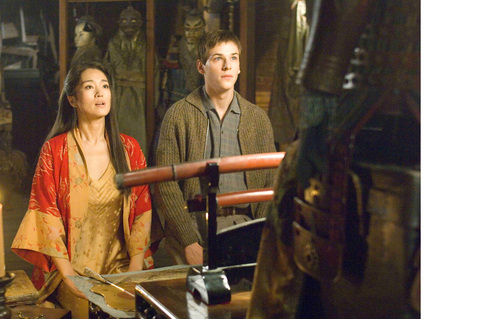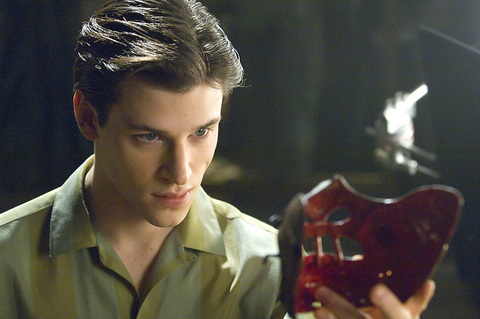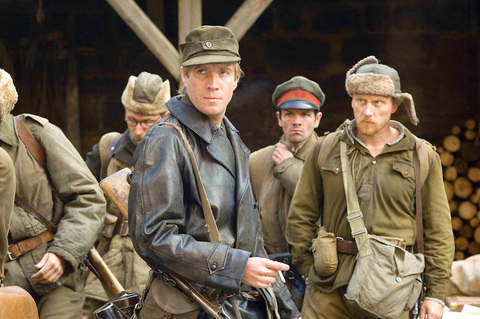Given the recent spate of horror-movie prequels, we can at least be grateful that the makers of Hannibal Rising, in perhaps their sole moment of clarity, decided that Hannibal: The Beginning might be a tad obvious. As it turns out, the title, with its priapic agency and whiff of retribution, is the high point of a back story that ought to have remained firmly in our imaginations. Like Leatherface and Freddy Krueger, Hannibal Lecter is a monster who thrives in the dark; probe his past, and there's a danger of finding only banality.
But this is America, where all pathologies must be excavated and neutralized, so we're off to 1944 Lithuania, where the Lecter family is facing down Nazis, Russians, Vichy French and wild boars. The arrival — and subsequent dinner plans — of a gang of starving thugs swiftly disposes of young Hannibal's little sister and awakens his cannibalistic cravings. Eight years in a Soviet orphanage do little to rehabilitate. "You do not honor the human pecking order," the warden tells Hannibal (Gaspard Ulliel). ''You're always hurting the bullies." Clearly he's more disturbed than we think.
Scarcely pausing to wonder which wine goes best with East European thug, Hannibal sets out to avenge his sister and devise recipes. His mission entails a detour in a Parisian medical school to hone his slicing technique, as well as a sojourn with a Japanese aunt (Gong Li, 鞏俐) who's unperturbed when he beheads a butcher who has insulted her honor.

PHOTOS COURTESY OF CMC
''You smell of smoke and blood,'' she tells her nephew fondly, struggling with dialogue that would make Jessica Simpson demand a rewrite. Silly, slack and unforgivably tedious, Thomas Harris' screenplay is padded with interminable flashbacks and a bombastic score that telegraphs every emotion Hannibal represses. And there are a lot of them.
Evidencing too much respect and too little energy, Peter Webber directs this operatic mess with none of the subtlety and wit he brought to Girl With a Pearl Earring, a less brutal but no less perverse project. Burrowing into the id of pop culture's most repulsive gourmet demands a sanguinary glee that Webber may not possess; for all the movie's spurting gore, there's no accompanying rush of blood to the head.
Almost everyone involved seems deadened by the literalness of the material, especially Ulliel, whose lanky, effete avenger may snack on the cheeks of his victims but never hardens into a genuine horror. He's like Anthony Hopkins's brain-damaged sibling.

Conceived in the clamor of the marketplace, Hannibal Rising, like its predecessor Hannibal, makes a star out of a character who should exist only in the margins, a peripheral terror made larger by mystery. The success of The Silence of the Lambs depends on a dense mixture of psychological intrigue and stylized flashes of brutality, glimpsed only from the corner of the eye like fleeting hints of Lecter's psychoses. Hannibal Rising drags these into the light and applies a magnifying glass, reducing one of our most mythic villains to a callow, dysfunctional chef.
"Oil of cloves," the French detective announces, sniffing one of Hannibal's victims. Even in the age of C.S.I. there are some clues only a Frenchman can be trusted to decipher.


June 9 to June 15 A photo of two men riding trendy high-wheel Penny-Farthing bicycles past a Qing Dynasty gate aptly captures the essence of Taipei in 1897 — a newly colonized city on the cusp of great change. The Japanese began making significant modifications to the cityscape in 1899, tearing down Qing-era structures, widening boulevards and installing Western-style infrastructure and buildings. The photographer, Minosuke Imamura, only spent a year in Taiwan as a cartographer for the governor-general’s office, but he left behind a treasure trove of 130 images showing life at the onset of Japanese rule, spanning July 1897 to

One of the most important gripes that Taiwanese have about the Democratic Progressive Party (DPP) is that it has failed to deliver concretely on higher wages, housing prices and other bread-and-butter issues. The parallel complaint is that the DPP cares only about glamor issues, such as removing markers of Chinese Nationalist Party (KMT) colonialism by renaming them, or what the KMT codes as “de-Sinification.” Once again, as a critical election looms, the DPP is presenting evidence for that charge. The KMT was quick to jump on the recent proposal of the Ministry of the Interior (MOI) to rename roads that symbolize

On the evening of June 1, Control Yuan Secretary-General Lee Chun-yi (李俊俋) apologized and resigned in disgrace. His crime was instructing his driver to use a Control Yuan vehicle to transport his dog to a pet grooming salon. The Control Yuan is the government branch that investigates, audits and impeaches government officials for, among other things, misuse of government funds, so his misuse of a government vehicle was highly inappropriate. If this story were told to anyone living in the golden era of swaggering gangsters, flashy nouveau riche businessmen, and corrupt “black gold” politics of the 1980s and 1990s, they would have laughed.

In an interview posted online by United Daily News (UDN) on May 26, current Chinese Nationalist Party (KMT) Chairman Eric Chu (朱立倫) was asked about Taichung Mayor Lu Shiow-yen (盧秀燕) replacing him as party chair. Though not yet officially running, by the customs of Taiwan politics, Lu has been signalling she is both running for party chair and to be the party’s 2028 presidential candidate. She told an international media outlet that she was considering a run. She also gave a speech in Keelung on national priorities and foreign affairs. For details, see the May 23 edition of this column,